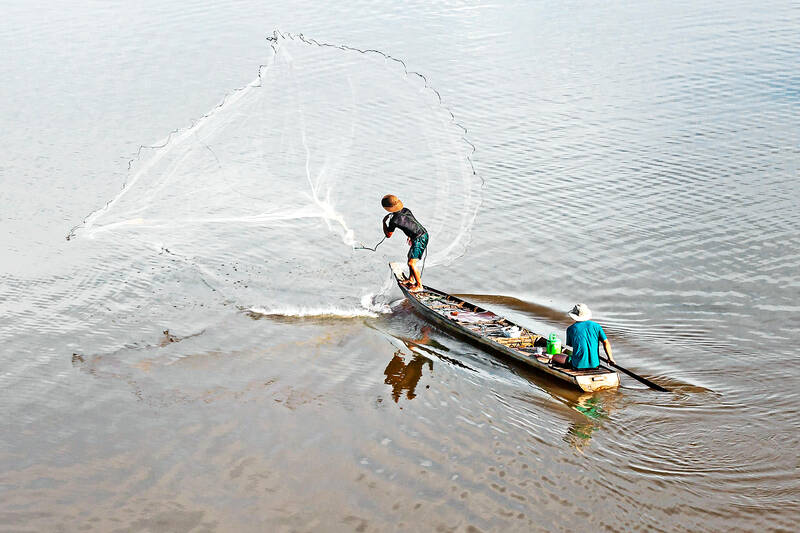When workers at a garment factory in Yangon, Myanmar, went on strike in February to protest starvation wages, their employer had the army called in.
“[It’s a] classic case of union-busting ... Military vehicles and police showed up to threaten them,” says Ray Cheng (鄭中睿), director of Youth Labor Union 95 (青年勞動九 五聯盟), a Taiwan-based labor rights group that exposes abuses by Taiwanese transnational corporations. “Then the company fired all 26 union members, claiming they’d skipped work [during the strike] and violated their contracts. It was outrageous”
The company in question is Taiwan-headquartered Pou Chen (寶成), the world’s largest manufacturer of branded athletic and casual footwear. The company has an ignominious history of rights violations in Southeast Asia. In 1997, reports of physical and sexual abuse at Pou Chen factories in Vietnam surfaced; in 2011, supervisors at a Pou Chen facility in Indonesia were caught assaulting their staff. Pou Chen dismissed the incidents as “isolated cases,” promising to improve training procedures.

Photo courtesy of Tom Fisk
The violations in Myanmar suggest little has changed. By establishing facilities in a country where labor rights oversights are practically nonexistent and independent unions have been outlawed following a military coup in 2021, Pou Chen has made little progress when it comes to labor rights.
The corporation is far from anomalous among Taiwanese manufacturers, as Cheng made clear at a recent labor rights conference.
Another company with a questionable rights record is Nien Hsing Textile Co (年興紡織), the world’s sixth-largest denim fabric producer, and a supplier for major brands such as Levi Strauss & Co. A 2019 report by the Workers Rights Consortium (WRC) — a US-based NGO that monitors labor rights in the garment industry — uncovered systemic gender-based sexual harassment and violence by supervisors at the company’s factories in Lesotho.

Photo courtesy of Van Long Bui
With employees distrustful of Nien Hsing’s internal resolution mechanisms based on previous failures and the company’s attempts to limit freedom of association, union activists and women’s rights groups took their grievances directly to the brands for whom Nien Hsing contracts. Historically such approaches had not enjoyed much success because of the “pricing power” of the manufacturers, says Cheng.
“When they don’t comply, the brands can’t do much because they can’t find anyone else to take up 60-plus percent of their supply,” says Cheng.
BRAND AWARENESS
However, there are signs that the brands are accepting responsibility for ensuring all elements of their supply chains are following environmental, social and corporate governance (ESG) regulations.
In the Nien Hsing case, unions and rights groups in Lesotho signed individual agreements with each brand, compelling them to reduce orders from the Taiwanese supplier in cases of the latter’s non-compliance.
Separate accords were inked with Nien Hsing itself, and the WRC and other US-based NGOs were also signatories to the agreements, which are now enforceable in US courts.
As an executive committee member of the Clean Clothes Movement East Asia Coalition, Cheng focused on Taiwan’s garment manufacturers during his presentation at the conference, which was organized by Taiwan Transnational Corporations Watch (TTNC Watch, 台灣跨國企業監察), a Taiwan-based coalition of seven groups advocating for human rights, labor rights, and environmental protection.
Another by Chang Yu-yin (張譽尹) spotlighted Formosa Plastics Group (FPG, 台塑集團), whose diverse operations include biotech, petrochemicals and electronic components production.
Chang, an attorney and executive director of the Environmental Jurists Association (環境法律人協會), expressed concern for the well-being of veteran activist Diane Wilson who has been on hunger strike since Oct. 31 to protest FPG transgressions in Vietnam and the US.
“She is becoming weak,” said Chang, whose Taiwan-based NGO comprises lawyers and scholars with expertise on environmental issues. “But Formosa has not responded.”
JUSTICE FOR ALL
Wilson’s action was initiated outside the FPG’s factory at Point Comfort, Texas to protest inadequate compensation for fishing communities in Vietnam that were devastated by toxic effluence from plants run by FPG subsidiary Formosa Ha Tinh Steel Corp in Vietnam’s Vung Ang Economic Zone in 2016.
She also cited the Point Comfort facility’s continued flouting of a “zero discharge” order as a motivation for her action.
The discharge condition was part of a US$50-million settlement — a record payout for a civil suit in the United States under the federal Clean Water Act — imposed on FPG in 2020 for plastic pollution of coastal waterways in Texas. At a congressional briefing in Washington, DC in September, Wilson noted that FPG had violated the order more than 500 times since the ruling, resulting in further fines of US$12.8 million.
“Our intent is to bring justice to the Vietnamese fishermen, and our petition in front of Formosa Plastics, Texas is to do just that,” Wilson told attendees at the briefing. “The Vietnamese fishermen deserve justice no less than the Texas fishermen did.”
In an e-mailed response to inquiries about the case, a spokesperson from Formosa Plastics Corporation, U.S.A. expressed “gratitude” for media interest in the case.
“Your coverage plays a vital role in raising awareness and holding us accountable for ensuring the safety of our environment,” wrote Mark A. Walker, a representative of the corporate communications department.
CAMPAIGN OF INTIMIDATION
Meanwhile, attempts to have the violations in Vietnam brought before Taiwan’s courts had seemed futile, before a milestone ruling by Taiwan’s Supreme Court in 2020. This overturned a High Court decision to dismiss the case for lack of jurisdiction.
However, Chang stressed that the process remained an uphill struggle, partly because of issues with lawyers gaining unfettered access to the Vietnamese plaintiffs and their advocates, who face persecution by the Vietnamese authorities, including lengthy incarceration and severe beatings.
“In some cases, it has been almost impossible for the Vietnamese plaintiffs to meet Taiwanese lawyers,” said Chang. “To do so, they would have to notify the local authorities, and that is basically like sending the victims to their oppressors.”

Google unveiled an artificial intelligence tool Wednesday that its scientists said would help unravel the mysteries of the human genome — and could one day lead to new treatments for diseases. The deep learning model AlphaGenome was hailed by outside researchers as a “breakthrough” that would let scientists study and even simulate the roots of difficult-to-treat genetic diseases. While the first complete map of the human genome in 2003 “gave us the book of life, reading it remained a challenge,” Pushmeet Kohli, vice president of research at Google DeepMind, told journalists. “We have the text,” he said, which is a sequence of

On a harsh winter afternoon last month, 2,000 protesters marched and chanted slogans such as “CCP out” and “Korea for Koreans” in Seoul’s popular Gangnam District. Participants — mostly students — wore caps printed with the Chinese characters for “exterminate communism” (滅共) and held banners reading “Heaven will destroy the Chinese Communist Party” (天滅中共). During the march, Park Jun-young, the leader of the protest organizer “Free University,” a conservative youth movement, who was on a hunger strike, collapsed after delivering a speech in sub-zero temperatures and was later hospitalized. Several protesters shaved their heads at the end of the demonstration. A

Every now and then, even hardcore hikers like to sleep in, leave the heavy gear at home and just enjoy a relaxed half-day stroll in the mountains: no cold, no steep uphills, no pressure to walk a certain distance in a day. In the winter, the mild climate and lower elevations of the forests in Taiwan’s far south offer a number of easy escapes like this. A prime example is the river above Mudan Reservoir (牡丹水庫): with shallow water, gentle current, abundant wildlife and a complete lack of tourists, this walk is accessible to nearly everyone but still feels quite remote.

In August of 1949 American journalist Darrell Berrigan toured occupied Formosa and on Aug. 13 published “Should We Grab Formosa?” in the Saturday Evening Post. Berrigan, cataloguing the numerous horrors of corruption and looting the occupying Republic of China (ROC) was inflicting on the locals, advocated outright annexation of Taiwan by the US. He contended the islanders would welcome that. Berrigan also observed that the islanders were planning another revolt, and wrote of their “island nationalism.” The US position on Taiwan was well known there, and islanders, he said, had told him of US official statements that Taiwan had not